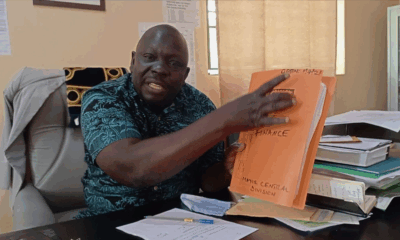Opinions
Why We Should Think Twice About Electing Financially Irresponsible Individuals to Political Leadership
In democratic societies, the right to run for office is a fundamental principle. Political leaders come from all walks of life, and financial hardship in itself should never be a disqualifier for leadership. However, financial irresponsibility, particularly chronic mismanagement of personal finances can and should raise serious questions about a candidate’s suitability for public office.
This article does not argue that being “broke” disqualifies someone from leadership. Financial hardship can be the result of systemic issues, economic injustice, or temporary personal setbacks. Instead, it focuses on why electing individuals who consistently demonstrate poor financial judgment or irresponsibility may pose risks to effective governance and public trust.
1. Financial Mismanagement Reflects on Decision-Making Ability
Leaders are required to make complex financial decisions, often involving billions in public funds. If a candidate has a history of unpaid debts, defaulted loans, bankruptcy due to overspending, or habitual failure to meet personal financial obligations, it raises questions about their ability to manage public resources wisely.
Just as we wouldn’t hire someone with a record of consistent personal financial mismanagement to be a corporate CFO, voters should be wary of handing over taxpayer money to individuals who have shown an inability to manage their own.
2. Susceptibility to Corruption and Compromise
Desperation breeds vulnerability. A leader who is under financial pressure may be more susceptible to bribery, corruption, or manipulation. Political corruption often begins with a personal need or weakness that powerful interest groups exploit. If someone is struggling to pay their bills or is burdened with personal debt, they might prioritize personal survival over public interest.
Public trust hinges on leaders who can remain independent and incorruptible even under pressure. Financial independence is not the only safeguard, but it does reduce the risk of compromise.
3. Personal Responsibility Is a Precursor to Public Responsibility
Leadership requires personal discipline, long-term thinking, and a sense of responsibility. Financial recklessness, living beyond one’s means, accumulating avoidable debt, or failing to honor financial commitments, may indicate a pattern of impulsiveness or lack of foresight.
While we should not conflate poverty with irresponsibility, we can and should distinguish between those who are broke due to external factors and those who are financially unstable due to personal negligence or mismanagement. Voters should examine the reasons behind a candidate’s financial situation, not just the condition itself.
4. Optics and Public Confidence Matter
Leadership is not only about competence but also about public perception. A leader’s image shapes national confidence. If a leader cannot manage their own affairs, many citizens may question their ability to represent the country’s best interests. Even if unfairly, public skepticism can undermine a leader’s effectiveness, making it harder to build consensus or inspire trust.
5. Financial Integrity Signals Ethical Leadership
Being financially responsible doesn’t mean being wealthy, it means being accountable. Leaders who live within their means, honor their obligations, and make prudent financial decisions send a signal of integrity. This kind of integrity often translates into ethical governance.
Voters should scrutinize candidates’ financial histories not to shame them, but to evaluate how they handle responsibility, pressure, and consequences, three things political leaders face daily.
Final Thoughts: Nuance Is Key
It is crucial to approach this topic with nuance and compassion. Economic hardship is a widespread issue that affects millions, and many great leaders have come from humble or difficult financial beginnings. What matters most is how individuals respond to their circumstances, how transparent they are about their histories, and what they’ve learned along the way.
Being broke is not a sin. But consistent financial irresponsibility, especially when accompanied by a lack of accountability or growth, may signal deeper issues that voters ignore at their peril.
In choosing leaders, we must not only look at their vision, charisma, or promises but also their track record of managing what was already entrusted to them.
Kris Muhembo
Comments


























